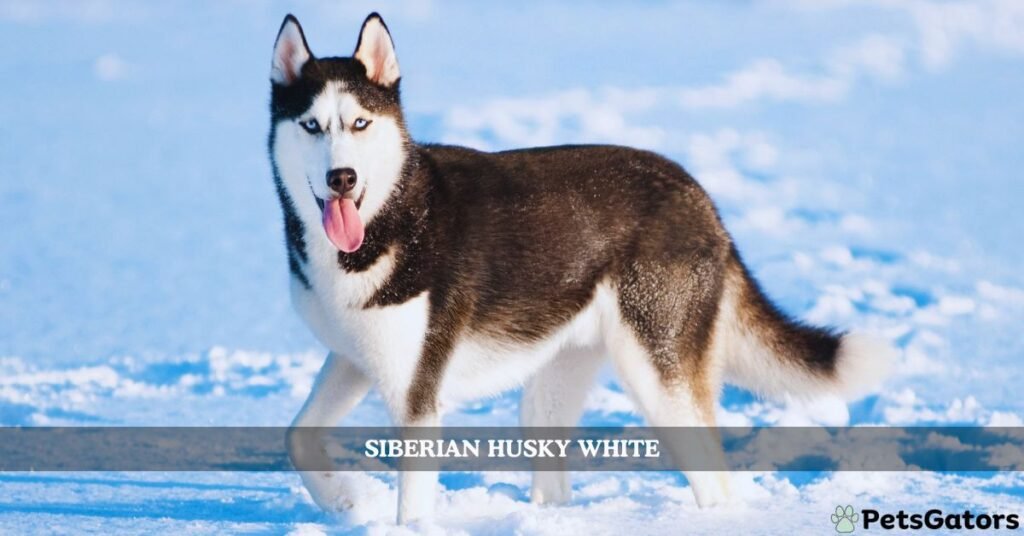White Siberian Husky are lovely and sociable. These canines are appealing and sociable with their white coats and energetic demeanor. From history and look to care, training, and health, this page addresses everything about the Siberian Husky white.
Siberian Husky Background
The Siberian Husky white has a long history going thousands of years. Originally developed by Siberian Chukchi people, these dogs were pulled sleds across great distances in hard Arctic circumstances. To the Chukchi, their capacity to labor hard and withstand frigid conditions made them priceless.
Early Uses and Roles
Siberian Huskies fulfilled many purposes in their societies, not just that of sled dogs. They offered friendship, helped her herd reindeer, and even went hunting with her. The Chukchi appreciated Huskies’ loyalty, power, and durability. These canines are excellent family companions and working dogs as they were developed with a pleasant attitude.
Arrival in North America
Early in the 20th century, Alaska welcomed the Siberian Husky white during the Gold Rush. Their speed and endurance in sled dog racing soon brought them fame. The breed gained notoriety during the demanding All Alaska Sweepstakes race, which highlighted their talents. This period solidified their reputation as reliable working dogs and loving companions.
Physical Traits of the Siberian Husky White
The Siberian Husky white is renowned for its exquisite look. Thick double coats on these dogs enable them to survive in frigid conditions.Their striking features include:
Coat Color and Texture
The Siberian Husky white’s most obvious feature is its exquisite white coat, which sometimes has cream or gray overtones. Their fur has silky, fluffy texture that acts as protection against the cold. Frequent grooming helps to preserve the look and condition of the coat.
Eyes and Facial Features
While some Siberian Husky whites may have brown or even heterochromia, in which case each eye is a different hue, many have stunning blue eyes. Their well-proportioned head and upright ears accentuate their remarkable look; their almond-shaped eyes convey an expressive quality.
Build and Size
Their athletic physique, which falls medium-sized, communicates strength and dexterity. Men usually weigh 45 to 60 pounds; women vary in weight from 35 to 50 pounds. Usually, their height at the shoulder ranges between 20 and 24 inches. The well-balanced form of the breed lets them shine in all kinds of physical exercise.
Temperament and Personality
One of the most beautiful traits of a Siberian Husky white is its disposition. These dogs are known for being:
Friendly and Sociable
Usually amiable and happy to be with humans, Siberian Husky whites. Their passion to be part of the family and kind demeanor are well-known. This breed is great family friend as they are usually friendly with children and other animals.
Energetic and Playful
High energy levels need for consistent exercise and mental stimulation. Their favorite pursuits include jogging, hiking, and fetching. A bored Husky might become destructive, hence it’s important to provide them plenty of mental and physical activities.
Intelligent but Independent
They might be autonomous thinkers even if they are smart and fast learners of orders. Training thus might need both constancy and patience. Huskies are known for their stubbornness, hence positive reinforcement strategies may assist to build a strong connection and efficient training.
Loyal Companions
Siberian Huskies white are renowned for their family devotion. They usually develop close bonds to their human caretakers and live best in company. Excellent family dogs, this commitment may also result in a protective quality.
Care and Grooming Tips
Caring for a Siberian Husky white involves understanding their grooming and health needs. Here are some essential care tips:
Grooming
Their thick double coat needs constant brushing to reduce shedding and maintain its natural beauty. Two times a year, shedding seasons call for more regular grooming. Loose fur may be removed and matting avoided using a slicker brush and a comb.
Bathing
Siberian Husky whites should be washed as necessary usually every few months or when they are really soiled. Maintaining the condition of their coat, use a dog-specific shampoo. To prevent skin irritation, be sure you rinse very well.
Health Care
To keep your Siberian Husky white, regular veterinarian visits, immunizations, and preventive maintenance are very vital. Common health problems include eye diseases and hip dysplasia, hence knowledge of their health is crucial. Consider a regular wellness plan with your veterinarian to monitor their health.
Dental Care
Though often disregarded, a dog’s general well-being depends on dental health. Regular tooth brushing for your Siberian Husky white will assist to maintain their teeth clean, furthermore, provide dental treats to aid with this. Additionally early detection of any such problems may come from regular dental visits to your veterinarian.
Read Previous – Anatolian Shepherd Great Pyrenees mix
Training Your Siberian Husky White
Training a Siberian Husky white can be rewarding but may also present challenges. Here are some effective training tips:
Start Early
Starting training and socializing early on will help your puppy become a well-adjusted adult dog. Early contact to several surroundings, people, and other animals will help them become confident and flexible.
Positive Reinforcement
Encourage desirable actions using positive reinforcement tools including sweets and compliments. Steer clear of rigorous training techniques as they could backfire. Huskies respond well to a reward-based system, so consistency is key.
Socialization
During their vital socializing period between three and fourteen weeks expose your Siberian Husky white to many people, places, and events. This helps avoid in maturity violent behavior and anxiety.
Leash Training
Huskies have a great prey drive, hence leash training is very important. First teach simple instructions like “sit” and “stay,” then introduce leash walking. Before leaving into more crowded regions, practice in a safe surroundings.
Advanced Training
Consider enrolling your Husky in obedience or agility classes. These can provide mental stimulation and strengthen your bond. Engaging in training activities can also help channel their energy positively.
Exercise Needs
To be cheerful and healthy, Siberian Huskies white need a lot of activity. Here are some tips to meet their exercise needs:
Daily Walks
Try to get between one and two hours of daily activity. Walking, running, or fun in a safe yard may all count here. Participating in different activities can help your Husky remain both physically and psychologically occupied.
Outdoor Adventures
Huskies work best outside. Excellent methods to meet their demand for activity include snow-based hiking, jogging, and playing. Make sure your Husky has a safe place free from constraints for running and playing.
Mental Stimulation
Apart from physical activity, use interactive play, puzzle toys, and training courses to provide brain stimulation. Engaging their brains helps to avoid boredom and lessens bad habits.
Dog Sports
Think about including your Siberian Husky white in weight pulling, agility, and flyball. These pursuits give socializing chances as well as a terrific way for their brains and energy.
Nutrition and Diet
Maintaining the health of your Siberian Husky white depend on a well-balanced food. Consider the following:
High-Quality Dog Food
Select a premium dog food that fits your dog’s age, weight, and degree of activity. Starting with items containing actual meat, steer clear of fillers and synthetic additions.
Feeding Schedule
To assist maintain their weight and general health, set a regular feeding schedule usually twice a day. Steer clear of free-feeding as, if food is constantly accessible, Huskies may overindulge.
Monitoring Weight
Check your Siberian Husky’s weight often and change their nutrition as necessary. See your veterinarian if you see any notable weight changes; obesity may cause a variety of medical problems.
Treats and Snacks
Though goodies may be utilized for training, consider their calorie count. Choose sensible snacks and restrict daily intake of them. Moreover good snack choices include fresh fruits and vegetables.
Common Health Issues
Knowing possible health problems can let you to provide your Siberian Husky white better treatment:
Hip Dysplasia
Common in many dog breeds, including Huskies, is a hereditary disorder. Frequent veterinarian visits assist to identify any problems early on. Furthermore helping their joint health is keeping a good weight and offering joint supplements.
Eye Conditions
White Siberian Huskies are prone to several eye diseases including progressive retinal atrophy and cataracts. Frequent eye tests provide early identification of issues, therefore enabling quick treatment.
Skin Allergies
Environmental causes or dietary sensitivities may cause skin allergies in Huskies. Good nutrition and consistent grooming help to reduce skin problems. See your veterinarian if you have persistent itching or irritation.
Hypothyroidism
The synthesis of thyroid gland hormones is insufficient in this condition. Among the many health issues it might cause are tiredness and weight increase. Regular blood testing may find thyroid problems early on.
Living with a Siberian Husky White
Though it needs dedication, owning a Siberian Husky white may be a happy experience. These considerations should help you decide whether to introduce a Husky into your house:
Space Requirements
Huskies do best in settings where they may wander and investigate. Let children play securely in a secure, fenced yard. Make sure you can provide enough mental stimulation and exercise if you live in an apartment.
Companionship Needs
White Siberian Huskies are companionable sociable dogs. Long stretches of time should not be left for them alone as this will cause separation anxiety and boredom. To keep your second dog socialized, think about keeping frequent playdates or adopting another dog.
Climate Considerations
Although Huskies are designed for frigid environments, with enough care they can adjust to milder temperatures. During hot days, make sure they have fresh water and shade; steer clear of heavy activity during the hottest times.
Conclusion
All things considered, the Siberian Husky white is a remarkable breed that offers any house happiness, devotion, and vitality. Families and people both would find great friends in them because of their attractive looks, kind attitude, and lively character. Potential owners should be ready, nevertheless, to satisfy their demands for exercise, grooming, and training.
Understanding the past, physical characteristics, temperament, care needs, and any health problems connected with this breed will help you to guarantee a good and healthy life for your Siberian Husky white. You will create a lifetime of close relationship with your animal buddy by loving, patient, and dedicatedly.
FAQs
How much exercise do Siberian Husky whites need?
A Siberian Husky white requires walks, fun, and cerebral stimulation among other daily activities ranging in minimum one to two hours.
White Siberian Huskies good with kids?
Yes, they are great family pets as they are usually amiable and social dogs that fit youngsters.
How frequently should I groom my white Siberian Husky?
To control their thick double coat, they should be brushed minimum once a week and given more regular brushing during shedding seasons.
What are frequent white Siberian Huskie health issues?
Typical medical problems include hypothyroidism, eye diseases, skin allergies, and hip dysplasia. Early diagnosis depends on routine veterinarian visits.
Are white Siberian Huskies appropriate for first-time dog owners?
Although they would be wonderful friends, first-time dog owners may find their independent character and exercise requirements difficult. A good partnership requires both appropriate dedication and training.
Stay connected and updated with – PetsGators.com!







